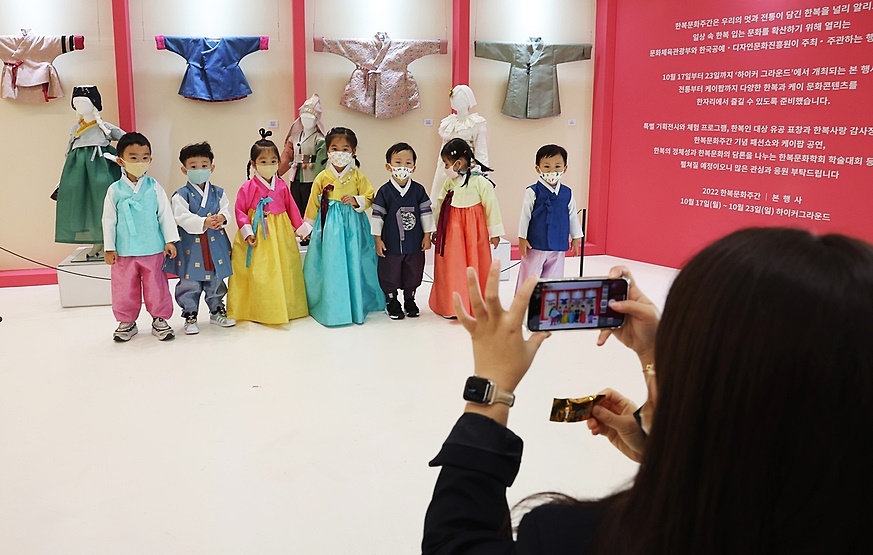Information Center
- Main page
- Information Center
- Government News
Government News
- Source
- KOREA.net
- Date
- 2023.01.16

The Ministry of Health and Welfare on Dec. 13 released its fourth mid- to long-term basic plan for child care (2023-27) after deliberation by its Central Child Care Policy Committee. The photo shows children on Oct. 19 at a Hanbok exhibition hosted by the tourism promotion center HiKR Ground in Seoul's Jung-gu District to mark the nation's centennial Children's Day anniversary. (Ministry of Culture, Sports and Tourism)
The government from Jan. 1 will launch "parental pay" and provide KRW 700,000 per month to a household with a child under age 1 and KRW 350,000 for a family with a one-year-old.
The Ministry of Health and Welfare on Dec. 13 announced its fourth mid- to long-term basic plan for childcare (2023-27) after deliberation by its Central Child Care Policy Committee.
Covering the developmental direction of child care services for the next five years, the plan presents the visions and tasks of optimal national support focusing on comprehensive care of infants and toddlers and raising the quality of child care services.
Parental benefits to take effect on Jan. 1 will strongly complement household income over the first two years of a child's life to offer parental options in childrearing.
The parent pay is KRW 700,000 per month for a household with a toddler under age 1 and that figure rises to KRW 1 million in 2024. A family with a one-year old gets KRW 350,000 per month and KRW 500,000 from 2024.
The plan will expand the types of child care like hourly babysitting for households who need temporary assistance and another service for children aged 12 or below. Also included are stronger links among child care services through a comprehensive childrearing support center and lower costs of baby care.
Considering demand for the regular use of part-time child care, a new model will integrate and run with classes at daycare centers and raise user convenience by improving application and payment methods for child care services.
The number of hours for child care for children aged 12 or under will rise from 3 1/2 hours to four and that of eligible families from 75,000 to 85,000. Higher quality of services and more child care hours for children with medium to severe disabilities in phases are also planned.
Daycare centers and comprehensive childrearing support facilities near families will provide customized information as well as offer education for parents to enhance their childrearing capacity. To this end, daycare centers in regions will undergo development as central facilities to support child care that provide two-way and tailored information on related services.
The number of national and public daycare centers will keep rising so that the use of public child care facilities by 2027 will reach 50% or more and gaps between regions will be alleviated. More workplaces will have daycare facilities and the government will encourage and spread the development of specialized regional models of public daycare centers set up by the private sector.
First Vice Minister of Health and Welfare Lee Ki-il said, "The more prolonged the low birth rate is, the higher the importance of properly raising each child, so using our fourth mid- to long-term basic plan for child care as a milestone, we seek major advances in the quality of child care services and support over the next five years," adding, "We will devise a detailed plan every year to faithfully fulfill the included tasks."
By Xu Aiying
xuaiy@korea.kr